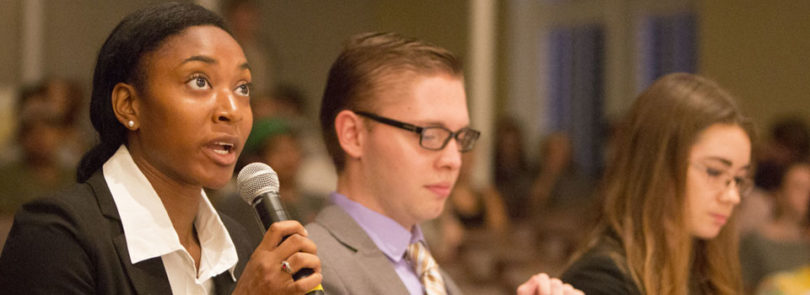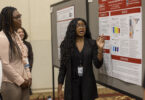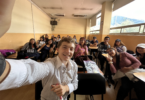Torre Lavelle experienced what she hopes won’t be a once-in-a-lifetime opportunity when she presented a policy paper at the White House in late 2014. The idea for her white paper — on Environmental Protection Agency carbon emissions regulations — and the invitation to the White House stemmed from her involvement with the Roosevelt Institute at UGA.
“I couldn’t have done it without the network I have here. Being able to present my ideas not only within the Athens community but at the state and national level, I feel like I’m making an impact,” the junior says.
The Roosevelt Institute Campus Network, founded in 2004, is a national organization that strives to uphold the values cast into the public discourse by Franklin, Eleanor and Theodore Roosevelt and to promote the next generation of leaders through progressive policy. In 2006, Rhodes Scholar Deep Shah and Gabriel Allen co-founded the UGA chapter of the student-run think tank that teaches its members how to approach problems and create policy analyses.
In 2014 UGA was named Chapter of the Year for the Roosevelt network, which has 115-plus chapters in 38 states with more than 10,000 members.
UGA’s Roosevelt students have presented their white papers in Atlanta, Washington, D.C., and around the world. Congressmen and government officials have attended Roosevelt-sponsored symposiums on UGA’s campus.
This spring the ideas of eight UGA students were published in the Roosevelt Institute Campus Network’s 2015 edition of 10 Ideas, an undergraduate policy journal series. Two of the proposals — “Addressing Sexual Assault at the University of Georgia” by Cali Callaway and “Fighting Pain with Pills: Overprescribing and the Opioid Addiction Epidemic” by Erin Hollander — were selected as nominees for Policy of the Year, placing them among the best of the best student-generated policy ideas in 2015.
In addition, nearly every one of UGA’s recent recipients of top scholarships — including the Rhodes, Marshall and Truman — have participated in the UGA chapter and Roosevelt Scholars course.
“It’s a wonderful campus laboratory for our best and brightest students,” UGA President Jere W. Morehead said. “For me, what makes the Roosevelt Institute so important is it allows students the opportunity to develop policy ideas in an academic environment and then test those ideas out on real policymakers who have touched the Roosevelt Institute over time, whether they are senators or congressmen or leaders in the General Assembly.”
Shah saw Roosevelt as a way for students interested in policymaking to come together and focus on their ideas. University Professor Emeritus Gary Bertsch, then with the Center for International Trade and Security, told him about the Roosevelt Institute and suggested starting the chapter. The first year, the club had about 20 students; now it has about 100.
“I don’t think we ever knew it would attract that much interest,” said Shah, who is now an internal medicine and primary care physician resident in the J. Willis Hurst Internal Medicine Residency Program at the Emory University School of Medicine. “The first cohort believed in the power of college students to influence the policymaking process.”
Students and faculty from public health, education, economics, international affairs, ecology, family and consumer sciences, and other departments, schools and colleges are a part of Roosevelt at UGA. The Roosevelt Issues Forum, hosted by the Honors Program for all students every month, seeks to sharpen their awareness of state, national and global issues.
Some students who attend the forums get more involved through the Roosevelt chapter and Roosevelt Scholars course, a three-hour research course that averages 15 students each fall.
“The importance of the University of Georgia Roosevelt chapter is that it is mature, it is robust and it can provide a leadership role across the nation,” said David Williams, UGA Honors Program director and the Roosevelt Institute faculty adviser.
Kameel Mir, the club’s co-executive director, said the students are passionate about their projects and inspired by the possibility of having an impact.
“That’s really what the heart of the club is about. These kids not only want to develop themselves academically in their ability to write a policy paper, but they want to find ways to implement these ideas,” said Mir, who is earning a bachelor’s in international affairs and bachelor’s and master’s degrees in English literature. “You can also make active change, even at the age of 20, if you want to.”
For some students, it sharpens their career path.
Former chapter executive director Lucas Puente, who interned in the office of then-U.S. Sen. Barack Obama, says Roosevelt gave him the best preparation for participating in the UGA Washington Semester Program in 2008.
“It was great to take what I learned about the policy process through Roosevelt at UGA my first two years and enhance that education in the actual policymaking environment of the Beltway,” said Puente, who is now pursuing a doctorate at Stanford University.
Alex Edquist, an economics major and 2014-2015 Roosevelt chapter co-director, presented her policy on making the federal prison system more cost effective as it pertains to drug offenders during a 2014 conference in Budapest.
“Roosevelt has definitely been the most meaningful thing I have done on this campus,” she said.








